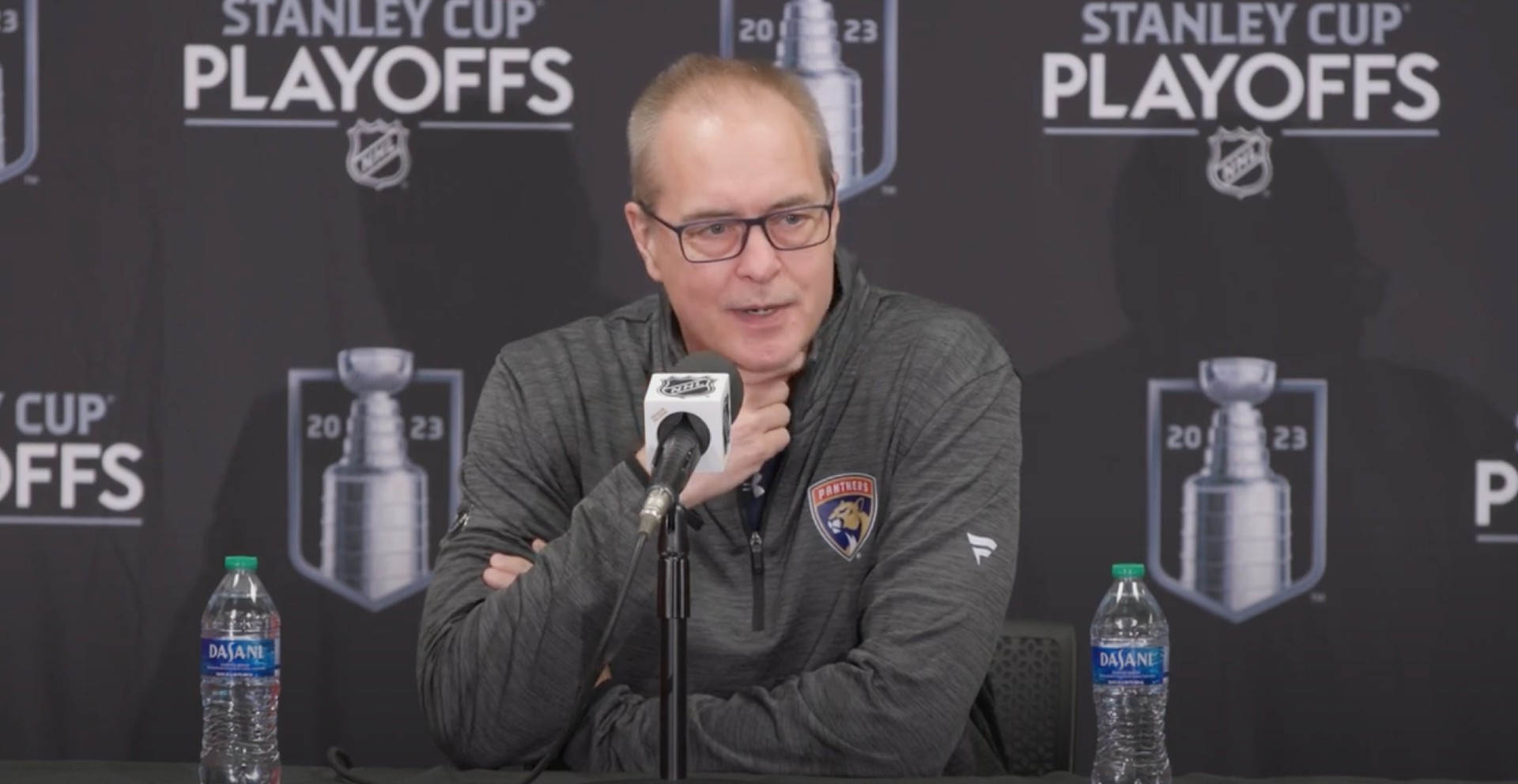On an off day on Monday, Panthers head coach Paul Maurice discussed his team’s 3-0 series lead, keeping the Leafs’ core forwards quiet offensively thus far, whether “killer instinct” is a real thing or a media narrative, and much more.
You guys have done a fantastic job of limiting Toronto’s top players. What has been the biggest factor in accomplishing that so far?
Maurice: I don’t know. I go through the video, and I don’t feel that. We gave up about five two-on-ones in the first seven minutes of [Game 3]. In the second half of Game 2, there was lots there. It is just inches inside the post or outside the post that is the difference with those kinds of players.
We have missed some chances, too. They had a whole bunch of two-on-ones. We had a bunch of breakaways that change everything when it doesn’t go in. The game stays where it is.
Each team probably could’ve gone on goal runs, and they just haven’t happened. The spotlight is normally on the guys you don’t expect to score. I understand it. Barkov didn’t get any shots in his first game against Boston. That was a story. When Dalpe scored in the series, that is a story.
What are your thoughts on “killer instinct?” Is it something certain teams and certain players have, or is it something the media comes up with to describe teams that win?
Maurice: Yeah, I have never gotten that. Nobody comes to the rink casual ever in the playoffs.
Are you powerful enough to will a team down? Sometimes that is more talent. Our team is playing its ass off as hard as it can. We don’t have four more gears to get to. Drop the puck, it’s top speed, and it’s all we got. The results take care of themselves.
If you win the next game, I don’t think you’ve found your killer instinct. I don’t think we are stalking anybody and decided to pounce now. That’s kind of a cat reference, I think.
I get it in the vernacular of pro sports. If you win the last game, you show killer instinct. I just never particularly understood that.
It would go back to the idea and the theme. Do you know what you are going to try to do? Go out there and play your ass off. That is it. Why would we necessarily try to change our mentality now? If you are in a game where you have a chance to win, play your ass off. See what happens.
When you have been behind the bench of teams that have gone on deep runs, is there any quality or common trait that those teams share that you notice with the Panthers?
Maurice: The players run the room. It gets to a point at a certain point in the season when the players run the room and the coach becomes smaller and smaller in importance as you go.
I don’t talk to the team before they go on the ice. I do in my meeting, but six minutes before, I am not in there firing them up. It is not my room anymore. The players run the room. They get themselves ready to play. They handle themselves on the bench.
I have stuff I have to do. I have a job, but all of the really funny stuff that goes on — all of the good stuff — that goes on in those runs…
Now, we have our own little room — the coaches’ room — and we are funny as hell back there and way offside most nights, but the players take over the room and the emotional depth of the room.
A lot of people on the outside would assume the coach has his thumb on everything. Where did it come from with you to give the players more freedom than most people would think a coach would allow?
Maurice: I am maybe not articulating it right. We have a set of things that we do — a set of standards designed to a concept that fits the style of play of the personnel that you have. But we don’t sit with them on the plane, on the bus, or in the room.
There comes a time when you are standing behind the bench, you go to say something, and someone else is saying it. That is way more impactful.
“We have to pick up that F3 through the middle.” Someone else says it, so I don’t have to say that anymore.
If you give up a goal and three guys get up and down the bench, “We’re fine. We’re fine.” I don’t have to say that anymore.
That is more what I mean. We have a job, but the players eventually take it over.
With the way the quiet leadership of Sasha Barkov has kind of meshed with Matthew Tkachuk and Sam Bennett, is it more of a sharing of the leadership or spotlight with a guy in Barkov who appreciates maybe not getting as much glare?
Maurice: I would think that Barkov really enjoys having Matthew here. [Barkov] is a quiet man. He is articulate and very bright. He is just a quiet man.
So much of his leadership is truly by example. He is a very fit guy. He comes to camp and is a coach’s dream. He works his butt off in practice every day. There are never any issues.
First question: Where are you most comfortable on the power play? “I’ll play anywhere.” My god. That is him.
There is a section of people in your locker room who can relate specifically to that — some of his countrymen and the people whose personalities are like that. He has a group of people he relates to.
And then you have the Tkachuk world. And then there are a whole bunch of great stories in there like the Ryan Lombergs, the Nick Cousins, the Radko Gudas’, and Marc Staal’s sense of humour. Everyone has a piece and a little neighbourhood that they run.
It feels as though Aaron Ekblad has been playing his best hockey of the year. Is it a product of him being healthier than he has been all year? It seems like he and Gustav Forsling have really figured out that chemistry.
Maurice: I don’t think it is health. He got banged up in that Boston series. He is fine now, but there were a couple of games that were hard for him to get through. I was really impressed that he was able to come back and play.
In one of them, it was a tough night for him. Someone asked me what I thought of Aaron Ekblad’s game. I said it was amazing for what he was playing with. But he has gotten out of that.
What you are seeing is that Ekblad and Barkov’s games have built from game one of the playoffs to now. They are both really strong now. It goes to that appreciation. You get a little bit older and put a little bit more time in. The desire and the need to play well at this time of year is strong with those two.
The force is strong with that one.
We all know the importance of not getting ahead of ourselves and taking it a game at a time. But can players like Ekblad and Barkov enjoy the moment of it? They have both been on a lot of sad podiums with the players. Now it seems like both are looking around thinking, “This is weird.” Can they enjoy what is going on here?
Maurice: I am going to say yes. We openly talk about that idea in between periods. If you can’t enjoy it, you need to leave. And I know it for a fact.
I am not saying you are not wound up or you are not nervous or you are not all jacked up. You are, but if you can’t find a way to enjoy that, it is kind of sad. Why work your ass off your entire life and not enjoy the day that you worked your ass off to get to? It would make little sense.
How have you seen Sam Bennett evolve up close?
Maurice: It’s a major surprise for me. This is why I think [the media’s] job is so tough. I am in the room every single day. I am still trying to figure out my guys. I talk to them every day. I am there every day. I spend a lot of time, and I am still trying to figure them out.
When I am on the bench in Winnipeg and I am watching him in Calgary, I don’t know Sam Bennett. I know him as a player — third or fourth-line guy on the wing or in the middle. I have an idea of him as a player, and then I get here and it is completely the opposite.
You get through training camp, and you are going, “Oh man, can this guy move!” I knew he was a hard man. He is tough. But the consistency and the skill level I didn’t know.
That is why it is hard to do your job and truly understand players. You have 32 teams and you get to see him on TV. Even if you are covering him every day, you don’t get that deep understanding of a player.
He would probably be the biggest… maybe it is a surprise that is the right word, but this guy is a player, right? He is a unique player. He is really hard. He has excellent speed. He is incredibly consistent.
Even the mistakes that he makes — if you call them mistakes — are the same kind. They are through effort. You really never show him the next day. You go, “It didn’t work out, but he is trying his ass off.”
He would be the biggest surprise for me.
Sergei Bobrovsky is known for his legendary routine. No matter what the results are, he is always doing the same thing. What have you noticed differently about when he does put in the work and the results end up being different as they are now?
Maurice: Nothing. That is the point of what he does. He has a routine.
Over the last couple of years — and this would be anecdotally from conversations with [goalie coach] Rob Tallas — he has found different ways to recover, train, and get ready, as you should as you age. But he gets into a routine now that he has had all year from what I have noticed.
He goes on early. He has a stretching routine. He has a whole bunch of prep things that he does. He stays late. He is almost the last guy out of the room. That is his thing.
I am not joking around. I don’t know anything about goaltending. I know body language, right? I can feel when I think a guy is comfortable in the net and when he is not.
Sometimes, it doesn’t mean anything. At the start of Game 2, I don’t think he looked comfortable. The puck was bobbling a little bit on him, and then he was lights out.
I stay the hell away from the goaltenders. They freak me out.

































